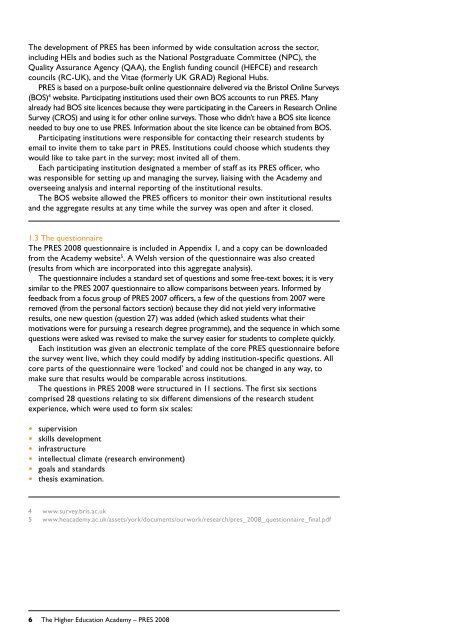Postgraduate Research Experience Survey 2008 Final report
Postgraduate Research Experience Survey 2008 Final report
Postgraduate Research Experience Survey 2008 Final report
You also want an ePaper? Increase the reach of your titles
YUMPU automatically turns print PDFs into web optimized ePapers that Google loves.
The development of PRES has been informed by wide consultation across the sector,<br />
including HEIs and bodies such as the National <strong>Postgraduate</strong> Committee (NPC), the<br />
Quality Assurance Agency (QAA), the English funding council (HEFCE) and research<br />
councils (RC-UK), and the Vitae (formerly UK GRAD) Regional Hubs.<br />
PRES is based on a purpose-built online questionnaire delivered via the Bristol Online <strong>Survey</strong>s<br />
(BOS) 4 website. Participating institutions used their own BOS accounts to run PRES. Many<br />
already had BOS site licences because they were participating in the Careers in <strong>Research</strong> Online<br />
<strong>Survey</strong> (CROS) and using it for other online surveys. Those who didn’t have a BOS site licence<br />
needed to buy one to use PRES. Information about the site licence can be obtained from BOS.<br />
Participating institutions were responsible for contacting their research students by<br />
email to invite them to take part in PRES. Institutions could choose which students they<br />
would like to take part in the survey; most invited all of them.<br />
Each participating institution designated a member of staff as its PRES officer, who<br />
was responsible for setting up and managing the survey, liaising with the Academy and<br />
overseeing analysis and internal <strong>report</strong>ing of the institutional results.<br />
The BOS website allowed the PRES officers to monitor their own institutional results<br />
and the aggregate results at any time while the survey was open and after it closed.<br />
1.3 The questionnaire<br />
The PRES <strong>2008</strong> questionnaire is included in Appendix 1, and a copy can be downloaded<br />
from the Academy website 5 . A Welsh version of the questionnaire was also created<br />
(results from which are incorporated into this aggregate analysis).<br />
The questionnaire includes a standard set of questions and some free-text boxes; it is very<br />
similar to the PRES 2007 questionnaire to allow comparisons between years. Informed by<br />
feedback from a focus group of PRES 2007 officers, a few of the questions from 2007 were<br />
removed (from the personal factors section) because they did not yield very informative<br />
results, one new question (question 27) was added (which asked students what their<br />
motivations were for pursuing a research degree programme), and the sequence in which some<br />
questions were asked was revised to make the survey easier for students to complete quickly.<br />
Each institution was given an electronic template of the core PRES questionnaire before<br />
the survey went live, which they could modify by adding institution-specific questions. All<br />
core parts of the questionnaire were ‘locked’ and could not be changed in any way, to<br />
make sure that results would be comparable across institutions.<br />
The questions in PRES <strong>2008</strong> were structured in 11 sections. The first six sections<br />
comprised 28 questions relating to six different dimensions of the research student<br />
experience, which were used to form six scales:<br />
••<br />
••<br />
••<br />
••<br />
••<br />
••<br />
supervision<br />
skills development<br />
infrastructure<br />
intellectual climate (research environment)<br />
goals and standards<br />
thesis examination.<br />
4 www.survey.bris.ac.uk<br />
5 www.heacademy.ac.uk/assets/york/documents/ourwork/research/pres_<strong>2008</strong>_questionnaire_final.pdf<br />
6 The Higher Education Academy – PRES <strong>2008</strong>

















